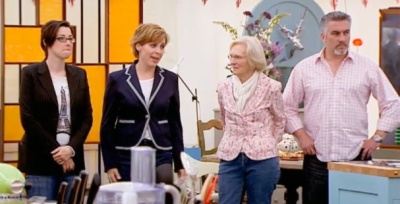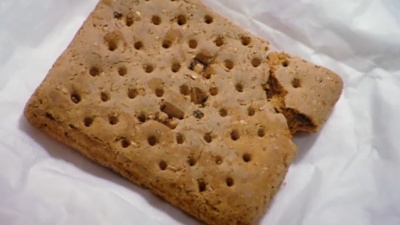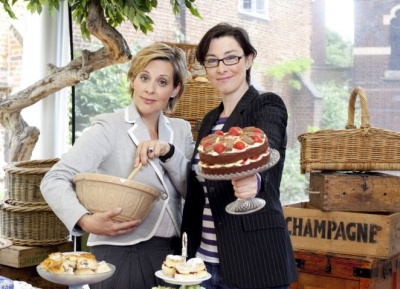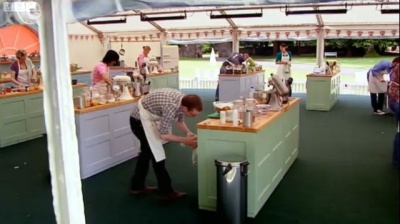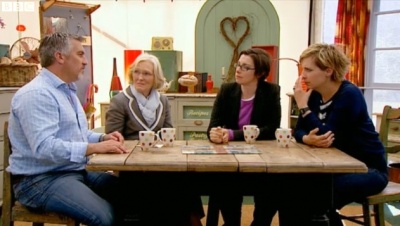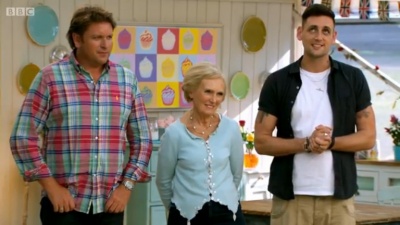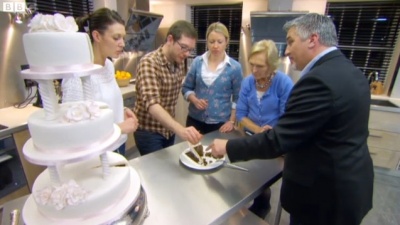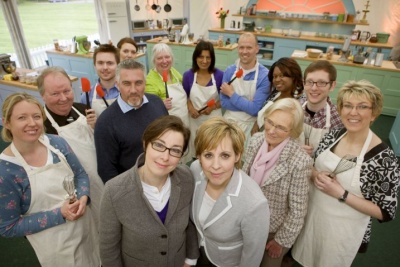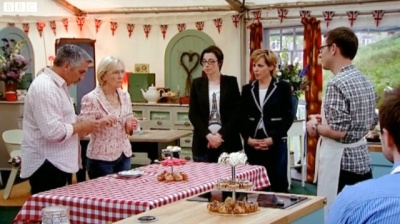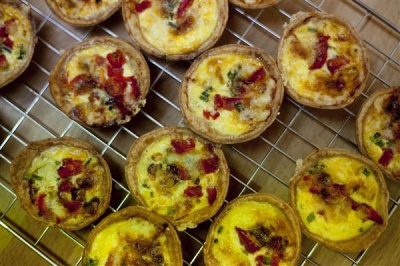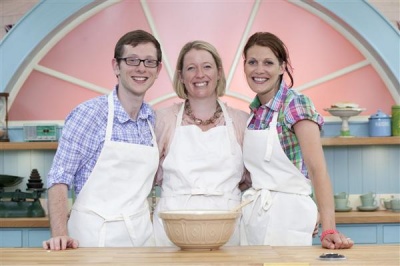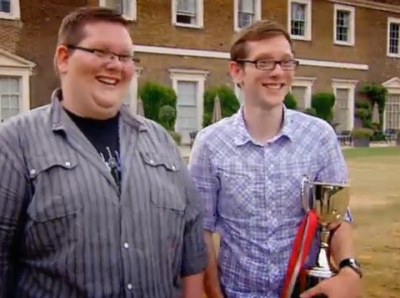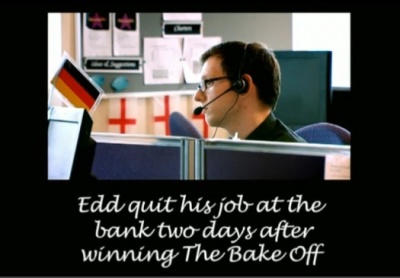The Great British Bake Off
Contents |
Host
Junior Bake Off:
Aaron Craze (2011-13)
Sam Nixon and Mark Rhodes (2015-)
The Great Sport/Comic Relief Bake Off:
Mel Giedroyc (2012-13)
Guest hosts (in order, but not including repeat performances): Sue Perkins, Jo Brand, Omid Djalili, Ed Byrne, Mel Giedroyc, Jennifer Saunders, Sarah Millican (2014-16)
Bake Off: Crème de la Crème:
Tom Kerridge
Co-hosts
Judges:
Paul Hollywood
Mary Berry
Junior Bake Off:
Paul Hollywood (2011)
Mary Berry (2011-13)
James Martin (2013)
Graham Hornigold (2015)
Allegra McEvedy (2015-)
Nadiya Hussain (2016)
Bake Off: Crème de la Crème:
Benoit Blin
Claire Clark
Cherish Finden
Voiceover: Stephen Noonan (2010)
BBC Two coverage (The Great British Bake Off: An Extra Slice): Jo Brand
Broadcast
Love Productions for BBC Two, 17 August 2010 to 17 December 2013 (34 episodes in 4 series + 16 specials)
Love Productions for BBC One, 6 August 2014 to present
The Great British Bake Off: An Extra Slice:
Love Productions for BBC Two, 8 August 2014 to 28 October 2016 (30 episodes in 3 series + 1 special)
Junior Bake Off:
Love Productions for CBBC, 31 October 2011 to present
The Great Sport/Comic Relief Bake Off:
Love Productions for BBC Two, 10 January 2012 to 16 January 2014 (12 episodes in 3 series)
Love Productions for BBC One, 11 February 2015 to 24 February 2016 (8 episodes in 2 series)
Bake Off: Crème de la Crème:
Love Productions for BBC Two, 29 March to 17 May 2016 (8 episodes in 1 series)
Synopsis
Mel and Sue host as ten home bakers compete in a nationwide baking contest. Each week sees the home bakers set three challenges designed to test a particular baking discipline. The home baker judged the best at the end of the series wins the title of Britain's best amateur baker. (What sort of a title is that? "Awesome Baker of the Year", that's a title.)
Each of the six weeks tests a different area of baking, and takes place in a different location. Each week there are three rounds. The first is the signature bake, which is essentially a free choice for each contestant (or 'baker', as they're more generally called) to dazzle the judges with their favourite recipe. Then there's the technical bake, in which all the contestants have to make the same thing, from one of the judges' own recipes (though they're not given the complete method, so have to fill in the blanks from their own experience and preference). And then there's the final challenge (since 2011, the showstopper challenge), which originally required each contestant to produce several varieties of a given thing (e.g. bread rolls or small cakes), in batches, though nowadays that task is usually featured in one of the other rounds and the showstopper is, as the name suggests, one big spectacular thing instead.
In each of the first two weeks, two contestants were eliminated at the end, then one was eliminated each week until the final. The elongated second series was a straight one-goes-each-week process.
In between the bouts of baking, Mel and Sue presented (separately) inserts about the history of baking. Don't expect all of these to make it into the commercial TV edits, even though they did manage to get some historians we vaguely recognise (like Kate Williams and Matthew Sweet) to contribute. Possibly the strangest contribution was the explorer Sir Ranulph Fiennes showing off "the world's most expensive biscuit" - the one that Robert Falcon Scott didn't live long enough to eat, which Fiennes paid £4000 for at auction.
So what did we think of the show overall? Frankly, at times it felt a bit half-baked. For one thing, why reunite a comedy duo and then give them almost no opportunity to interact? Also, an issue regarding the two judges: why did Paul Hollywood nearly always manage to overrule Mary Berry during the judging-process? While Hollywood's knowledge and ability as a master baker are certainly not in doubt, it often seemed ridiculous that Berry's equally intelligent and well-informed (albeit from a rather different angle) opinions appeared to have little or no influence in the decisions regarding who should stay and who should go - surely it should have been more of a two-way process?
And was it really necessary to make the contestants trek up and down the country like that? While the travelling aspect sometimes gave Mel and Sue a hook for their inserts on food history, it mostly seemed like the itinerary had been thrown together just for the sake of a few bad puns. Pastry in Cornwall (where the contestants were indeed asked to make Cornish pasties), fair enough. Puddings in Bakewell, OK. Bread in Sandwich was rather more contrived, considering that not only did he not invent it, but the Earl commemorated in the snack had only a nominal connection to the town and was actually from Northampton. Which means the town of Sandwich has about as much to do with the lunchtime staple as a Moray coastal town has with William G. Stewart's favourite Greek frieze. As for scones in Scone, don't get us started. On the positive side, it did mean that for once, when contestants said they'd been on A Journey, they really had.
If there was any intention that the contest being "on tour" would draw crowds of onlookers (and the open-sided marquee was clearly an invitation), it didn't really work due to the tent generally being pitched in various picturesque but out-of-the-way locations. They only really drew a crowd in Bakewell, the one place where the marquee went up in the town centre.
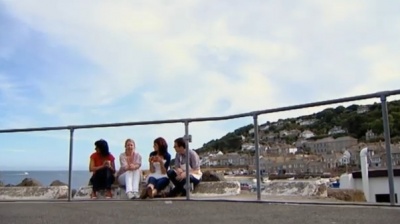 Mind you, the scenery was quite nice. Here's the final four, taking a teabreak in Mousehole, Cornwall.
Mind you, the scenery was quite nice. Here's the final four, taking a teabreak in Mousehole, Cornwall.Still, for all its faults, the series turned out remarkably well. There was a lot of camaraderie between the contestants, Mel and Sue were as likeable as ever (even if they never really got the opportunity to display the comedy skills that made them famous), and you could even learn a lot (no actual recipes - though many of them can be found online, on the official site or on the contestants' own blogs - but plenty of helpful tips).
Like good baking, it was a show that left us satisfied, but not exactly hungry for more. However, what initially appeared to be a one-shot summer filler has turned out to be a surprise hit (regularly topping BBC Two's weekly ratings), leading to a longer second series (eight weeks rather than six) with a number of subtle but positive tweaks, dropping the touring aspect and the separate voiceover, giving Mel and Sue a bit more space to do their thing, and - so far as we can tell - evening out the power balance between Berry and Hollywood. Which pretty much answers all of our original criticisms, so hats off to those responsible.
By 2013, the show was not just consistently the top-rated show on BBC Two, but was out-rating almost everything on BBC One as well (the final also notoriously outrated The X Factor that week). It was with a certain sense of inevitability that, two weeks from the end of the fourth series, it was announced that the show would be moving to its flagship channel BBC1 in 2014, with a spin-off show An Extra Slice taking up its BBC2 spotlight.
On BBC1, Bake Off grew from "huge" to "massive": a quarter of the country watched the show, week after week. Never mind the soaps, forget the football, Bake Off was the cultural glue to hold the nation together.
That glue snapped on 12 September 2016, when Love Productions announced they were taking the format to Channel 4. All hell broke loose: claims that Love Productions were only interested in the money, Mel and Sue saying that they "would not follow the dough", and millions of unsettled viewers.
Junior Bake Off
The show has proven such a success that this junior version effectively replaced Junior MasterChef in 2011. The series structure is closer to Junior Masterchef than adult Bake Off, with heats involving four children competing in two rounds. The first is almost exactly the same as MasterChef's "Classic Recipe Test", using one of either Berry or Hollywood's favourite recipes (jammy shortbread in the second edition), and this is followed with a creative bake in which the children are asked to produce a cake based on a certain theme (outer space was the first one and chocolate the second). The kids have so far proved both delightful and highly competent bakers, very competitive, yet also happy to enjoy the experience and with the all-important 'winning's a bonus' attitude. Berry and Hollywood have also adapted admirably to the new set-up, never talking down to the kids, and the latter's far less acerbic than usual, as is only right. New host Aaron Craze, an alumnus of Jamie Oliver's Fifteen training scheme, is also good with the kids, if perhaps a little gung-ho in his approach, but that's generally OK. He also originally presented some short historical/modern day inserts relevant to the theme of the day, similar to those that Mel and Sue do on the adult version, but these seem to have been dropped in the second series. Also missing from the second run is Paul Hollywood, replaced by James Martin.
Overall, another very enjoyable version of the show, and nice to keep it going for longer in the year - let's hope we get some more series, even if we didn't for Junior MasterChef.
Crème de la Crème
They've done regular shows, they've done children's shows, they've done celebrity editions. The final part of the quadrant is professional cooks, as tested on Bake Off: Crème de la Crème. It was professional, the baking was high quality, but the series felt a little off-kilter. Not as much feel-good bonhomie.
Champions
Winners of the "Domestic series"
| 2010 | Edd Kimber |
| 2011 | Jo Wheatley |
| 2012 | John Whaite |
| 2013 | Frances Quinn |
| 2014 | Nancy Birtwhistle |
| 2015 | Nadiya Hussain |
| 2016 | Candice Brown |
Junior Bake Off
| 2011 | Freya Watson |
| 2013 | Harry Duffy |
| 2015 | Amari Koryang |
Participants
Participants that were named "Star Baker" are in bold.
The Great British Sport/Comic Relief Bake Off
2012
Show 1
- Angela Griffin
- James Wong
- Joe Swift
- Sarah Hadland
Show 2
- Arlene Phillips
- Fi Glover
- Gus Casely-Hayford
- Saira Khan
Show 3
- Alex Deakin
- Alex Langlands
- Anita Rani
- Pearl Lowe
Grand final
- Angela Griffin
- Anita Rani
- Fi Glover
2013
Show 1
- Jo Brand
- Stephen K. Amos
- Lorna Watson
- Ingrid Oliver
Show 2
- Warwick Davis
- Duncan Bannatyne
- Simon Reeve
- Andy Akinwolere
Show 3
- Ellie Simmonds
- Kirsty Wark
- Julia Bradbury
- Bob Mortimer
Show 4
- Claudia Winkleman
- Ed Byrne
- Martha Kearney
- Helen Glover
2014
Show 1
- Bonnie Wright
- Johnny Vaughan
- Michael Vaughan
- Samantha Bond
Show 2
- Greg Rutherford
- Jane Horrocks
- Jason Gardiner
- Kirsty Young
Show 3
- Emma Freud
- Jamelia
- Michael Ball
- Victoria Pendleton
Show 4
- Alistair McGowan
- Doon Mackichan
- Helen Skelton
- Rochelle Humes
2015
Show 1
- Dame Edna Everage
- Joanna Lumley
- Jennifer Saunders
- Lulu
Show 2
- Jonathan Ross
- Zoe Sugg
- Gok Wan
- Abbey Clancy
Show 3
- Sarah Brown
- David Mitchell
- Michael Sheen
- Jameela Jamil
Show 4
- Alexa Chung
- Victoria Wood
- Chris Moyles
- Kayvan Novak
2016
Show 1
- David James
- Jason Manford
- Maddy Hill
- Samantha Cameron
Show 2
- Chris Kamara
- Ed Balls
- Kimberley Walsh
- Victoria Coren
Show 3
- Geri Horner
- Jermaine Jenas
- John Simpson
- Louise Redknapp
Show 4
- Ade Edmondson
- Alison Steadman
- Morgana Robinson
- Will Young
Key moments
Eventual champion John's injury during the strudel challenge in series three, which led to him being taken off to hospital, and nobody being eliminated that week. "He had a blood glove!"
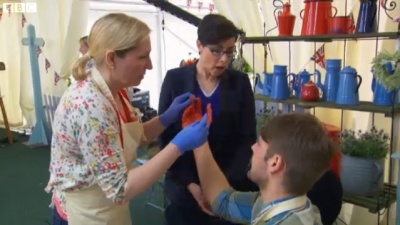 Is there a doctor in the marquee? An injured John Whaite receives medical attention from fellow contestant Danny Bryden, a hospital consultant.
Is there a doctor in the marquee? An injured John Whaite receives medical attention from fellow contestant Danny Bryden, a hospital consultant.The "bingate" incident with Iain's Baked Alaska in series five.
Thank god Gordon Ramsay wasn't there to witness it.
Catchphrases
"On your marks, get set....bake!"
Junior Bake Off:
"Have you all washed your hands?" - and the inevitable "Yes!" from the kids.
"These guys know their way round the kitchen, so if you fancy baking, make sure you ask an adult..."
The phrase "bake [their / my] socks off" came up rather too often in the first series of Junior Bake Off to be dismissed as coincidence. Sometimes it was Aaron or one of the judges who said it, other times the contestants, so we're guessing its elevation to a quasi-catchphrase may have been the result of someone having a bit of fun in the editing suite (and we know how they love to do that).
Trivia
Between the first two series, there was a special edition which, although it didn't actually acknowledge it on screen, was quite transparently made to tie in with the wedding of Prince William and Kate (or Catherine, as "the Palace" insists on calling her) Middleton. Called The Great British Wedding Cake, it reunited the three finalists from series 1 and challenged them to each make a "traditional wedding cake", and a "contemporary wedding bake". Mel and Sue were absent, and strangely weren't really missed, with the history inserts featuring Paul and Mary instead. Actually, now we think about it, it's maybe not that strange - after all, the two-judges-and-a-voiceover format has served Masterchef perfectly well for years. However, Mel and Sue returned for the second series proper.
A recurring visual motif in the second series was cutaway shots of squirrels in the vicinity of the marquee. The final such shot of the series - and undoubtedly deliberately held back for that honour - featured such a prominent display of sciurine genitalia that viewers were left in no doubt as to the rodent in question's masculinity... if you get our drift.
Speaking of editing decisions, if you pay attention to what contestant Holly is wearing during the second series semi-final you can pick up several continuity errors where things have been edited in, or in the case of Sue's timecheck, originally filmed, out of sequence. And at one point, dropped in from a different episode.
In 2012 and 2013, the regular series was filmed at Harptree Court in Somerset, which has since reported a lot of visitors posing for photographs on the little bridge the contestants cross to reach the tent. The 2014 series was filmed at Welford Park in Berkshire, but you'll be disappointed if you want a souvenir snap there as it's not generally open to the public. The 2011 series was filmed at Valentines Mansion in Ilford, which is still used for the Comic/Sport Relief version as many celebrities would crumble to dust if forced to travel outside the Greater London boundary.
With overnight ratings showing an average of 8.4 million and a peak of 9.1m, the 2013 final was BBC Two's highest-rating episode of a regular series in the 21st century, and probably its biggest audience since Oprah Winfrey's interview with Michael Jackson topped 11.5m back in 1993.
By the time Bake Off left BBC2 at the end of 2013, there had been nine "Masterclass" editions where Mary and Paul talked viewers through their favourite bakes; three "Revisited" shows looking back at the previous year's finalists; and some seasonal shows, two Christmas Masterclasses and one for Easter. Both Mary Berry and Paul Hollywood have gone on to make further series for the BBC about food and cookery, again made by Love Productions.
Trophywatch: Series 1 champion Edd Kimber received a traditional cup-style trophy, Series 2 winner Jo Wheatley got an enormous vaguely sculptural monstrosity made of mixing bowls and kitchen utensils. Then things settled down a bit, with subsequent champs receiving etched glass cake stands.
Merchandise
The Great British Book of Baking (hardback)
How to Bake the Perfect Victoria Sponge (hardback)
How to Turn Everyday Bakes Into Showstoppers (hardback)
The Great British Bake Off Everyday (hardback)
Say It With Cake (by Edd Kimber)
John Whaite Bakes (by, er, John Whaite)
And there's a wall calendar, set of notebooks, recipe folder, wooden spoon...
Web links
BBC programme page (The Great British Bake Off)
BBC programme page (An Extra Slice)
CBBC programme page (Junior Bake Off)
BBC programme page (The Great British Sport Relief Bake Off)
BBC programme page (The Great British Comic Relief Bake Off)
BBC programme page (Creme de la Creme)
Wikipedia entry (The Great British Bake Off)
Wikipedia entry (An Extra Slice)
Wikipedia entry (Junior Bake Off)
Wikipedia entry (Creme de la Creme)
Pictures
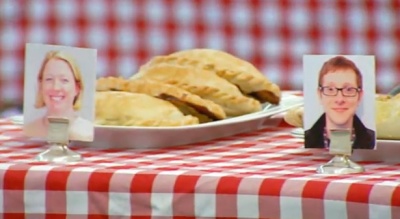 The technical bake is judged "blind" - these photos identify the baker, but face away from the judges so they don't know whose baking is whose.
The technical bake is judged "blind" - these photos identify the baker, but face away from the judges so they don't know whose baking is whose.See also
Weaver's Week review (2010); and Breadxit means breadxit on the move to Channel 4.


